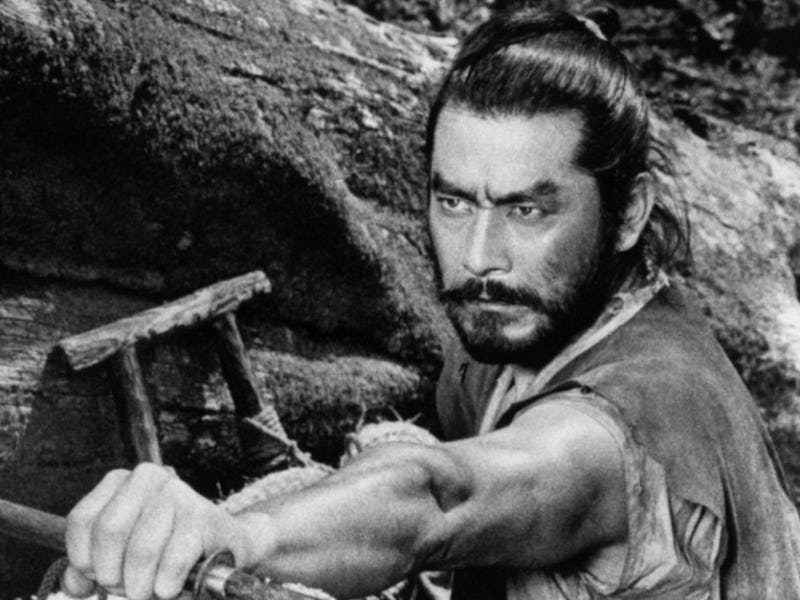One Akira Kurosawa Movie Proved to be the Greatest Inspiration for Star Wars
It’s not just samurai codes and Japanese-inspired robes.

Imagine this: there’s an old warrior who has long been rumored dead, but he’s part of a covert group on a mission to get the princess of a conquered kingdom to safety. Standing in the way is a scarred villain with a direct connection both to the evil empire as well as the old warrior. The warrior belongs to an ancient tradition.
Now imagine that it’s not Star Wars Episode IV: A New Hope. While George Lucas wore a lot of influences on his sleeves when he put together the first Star Wars trilogy, including Flash Gordon, obscure French comics, and more, Akira Kurosawa’s The Hidden Fortress proved one of the biggest influences on that galaxy far, far away.
While in film school in the 1960s, Lucas saw a screening of Seven Samurai and reported he was “hooked” by the Akira Kurosawa classic. “It’s really his visual style to me that’s so strong and unique, and a very powerful element of how he tells his stories,” Lucas told Criterion in a 2001 interview.
Lucas later in the same interview said that as he wrote the screenplay to Star Wars, he decided to tell it from the point of view of the “two lowliest characters.” Hidden Fortress has Tahei and Matashichi, two rejected soldiers who are just trying to make a quick buck between the few brain cells they have between them, while A New Hope has the droids there to observe as bigger things happen around them.
“The fact there was a princess trying to get through enemy lines and everything I think was more of a coincidence than anything else, because in my film, it was more of a stand-and-fight kind of princess,” Lucas said.
Misa Uehara’s Princess Yuki was no wilting wallflower.
Released in Japan 65 years ago today, The Hidden Fortress is, at its core, the story of General Rokurota Makabe (Toshiro Mifune), an old samurai with a reputation so fierce that enemies back away when they discover it’s him. As Makabe tries to get Princess Yuki (Misa Uehara) to safety, his companions Tahei and Matashichi (Minoru Chiaki and Kamatari Fujiwara, respectively) offer pretty fairweather help — when they aren’t trying to scheme off with the wealth of gold being transported. Recently, Yuki’s side, the Akizuki clan, has been vanquished in battle by the Yamana clan, so there’s a price on her head.
While Lucas would claim the similarities between Hidden Fortress and A New Hope were light, that’s not quite the case. Makabe’s “hidden fortress” where he hides the few remaining members of the royal family is in some barren, craggy cliff and hillsides, in a desolate area pretty much like Obi-wan Kenobi’s home on Tatooine. And later, when the Yamana clan finds the fortress, they slaughter what family is left behind, a lot like the death of Uncle Owen and Aunt Beru. And despite what Lucas says, Yuki is hardly a wilting flower. She’s confident and passionate, even if she never picks up a sword.
Then, of course, there’s General Hyoe Tadokoro (Susumu Fujita), a Yakana leader and old rival of Makabe’s. After an intense duel, Makabe has his face disfigured, blaming the elder samurai. There are plenty of shades of Darth Vader / Obi-Wan’s relationship here, and the duel feels a lot, visually, like the one on the Death Star that leads to the death of Kenobi. Once our heroes are brought to safety, it also looks a bit like Yavin 4. Tahei and Matashichi even get a “medal,” of sorts, for being reluctant heroes who might’ve turned at any point, like Han Solo and Chewie in the first film, at least. (Though Solo and Chewie were far more heroic.)
The band’s mission to rescue the princess of a conquered kingdom shares more than a few similarities with Star Wars.
There’s plenty that’s missing, of course. We don’t have a Luke Skywalker character to serve as audience surrogate. But Lucas said earlier drafts of the film had just a princess and an older Jedi trying to escape to safety. The “lowly characters” of this aren’t noble enough to be the droids or charismatic enough to be Han Solo and Chewbacca. It’s no true ripoff.
In the broad strokes, the inspiration that Kurosawa has on Lucas’ trilogy have long been apparent. The Jedi themselves have a pretty samurai-like code and brandish fearsome swords. And there’s, of course, the big “what if” casting trivia of Lucas reportedly wanting Mifune, one of Kurosawa’s standby actors, to play Darth Vader. But The Hidden Fortress is an important piece of the puzzle of the pastiche that became Star Wars. It was Lucas’ love letter to his youth, in a lot of ways.
But I don’t want to sell The Hidden Fortress short here because, like so many Kurosawa movies, it absolutely rips. It’s visually incredible with well choreographed fighting, and it’s easy to see why it has an enduring legacy of its own. While Seven Samurai is the one often finding its way onto greatest all-time film lists (a film that has a huge cinematic legacy of its own, such as its western remake, The Magnificent Seven), Fortress is among Kurosawa’s best.